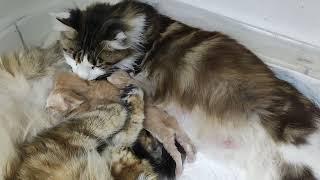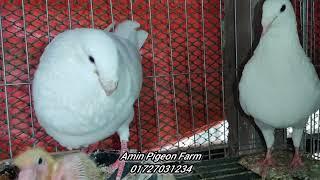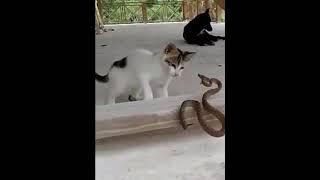Use coupon code "KITTENLIFE" to get 20% OFF The Best Cat Collars Available here :
https://www.bemixpets.com
Maine Coon Facebook Page :
https://www.facebook.com/MaineCoon.org/
Maine Coon Facebook Group:
https://www.facebook.com/groups/mainecoonorg
============================================================
#orientalcat #orientalshorthair101 #shorthair101 #cat101 #kittenlife101
In today's video, we are going to talk about a cat that is also a part of the Siamese family of cat breeds.
The Oriental Shorthair.
The Oriental Shorthair is a breed of domestic cat that is developed from, and some would say, a breed that is closely related to the Siamese cat. It maintains the modern Siamese head and body type, but appears in a wide range of coat colors and patterns. Like the Siamese, Orientals have almond-shaped eyes, a triangular head shape, large ears, and an elongated, slender, and muscular body. Their personalities are also very similar. Orientals are quite social, intelligent, and many are rather vocal. They often remain playful into adulthood, with many enjoying playing fetch. Despite their slender appearance, they are athletic, and can leap into high places. They prefer to live in pairs or groups and also seek human interaction. Unlike the breed's blue-eyed successors, Orientals are usually green-eyed. The Oriental Longhair differs only with respect to coat length.
While the breed's genetic roots are ultimately from Thailand, they were formally developed in the US by a number of New York area cat breeders. These cat breeders were led by Vicky and Peter Markstein, who were intrigued by lynx patterned cats with a Siamese body type. And during the 1970s, an "Oriental Shorthairs International" club was formed.
With a genetic history closely intertwined with the Siamese, Oriental Shorthairs are predisposed to the same health problems as their pointed relatives. However, the breed is generally considered to be healthy.
Health conditions that have been observed in Oriental Shorthairs include:
Bladder stones.
Dilated cardiomyopathy.
Liver amyloidosis.
With all of these in mind, you should take special care into what your Oriental cat eats.
Providing them with high-quality meals everyday can help lower the risks of these genetic diseases.
With regular visits to your local veterinarian, you can ensure that your loyal companion will live a happy and healthy life.
https://www.bemixpets.com
Maine Coon Facebook Page :
https://www.facebook.com/MaineCoon.org/
Maine Coon Facebook Group:
https://www.facebook.com/groups/mainecoonorg
============================================================
#orientalcat #orientalshorthair101 #shorthair101 #cat101 #kittenlife101
In today's video, we are going to talk about a cat that is also a part of the Siamese family of cat breeds.
The Oriental Shorthair.
The Oriental Shorthair is a breed of domestic cat that is developed from, and some would say, a breed that is closely related to the Siamese cat. It maintains the modern Siamese head and body type, but appears in a wide range of coat colors and patterns. Like the Siamese, Orientals have almond-shaped eyes, a triangular head shape, large ears, and an elongated, slender, and muscular body. Their personalities are also very similar. Orientals are quite social, intelligent, and many are rather vocal. They often remain playful into adulthood, with many enjoying playing fetch. Despite their slender appearance, they are athletic, and can leap into high places. They prefer to live in pairs or groups and also seek human interaction. Unlike the breed's blue-eyed successors, Orientals are usually green-eyed. The Oriental Longhair differs only with respect to coat length.
While the breed's genetic roots are ultimately from Thailand, they were formally developed in the US by a number of New York area cat breeders. These cat breeders were led by Vicky and Peter Markstein, who were intrigued by lynx patterned cats with a Siamese body type. And during the 1970s, an "Oriental Shorthairs International" club was formed.
With a genetic history closely intertwined with the Siamese, Oriental Shorthairs are predisposed to the same health problems as their pointed relatives. However, the breed is generally considered to be healthy.
Health conditions that have been observed in Oriental Shorthairs include:
Bladder stones.
Dilated cardiomyopathy.
Liver amyloidosis.
With all of these in mind, you should take special care into what your Oriental cat eats.
Providing them with high-quality meals everyday can help lower the risks of these genetic diseases.
With regular visits to your local veterinarian, you can ensure that your loyal companion will live a happy and healthy life.
- Catégories
- Chats de Race Javanais
- Mots-clés
- cats, oriental shorthair, kittens
















Commentaires